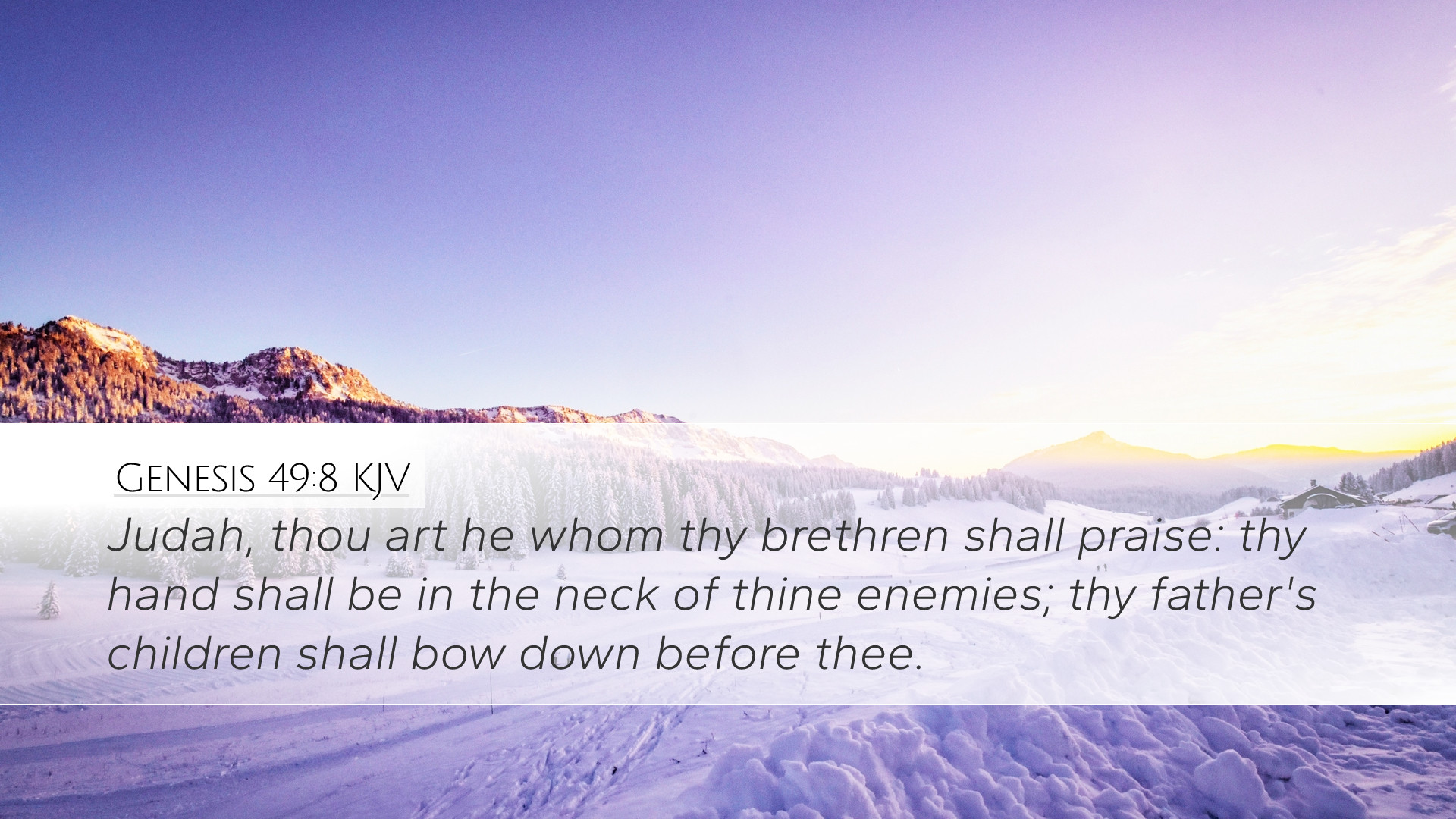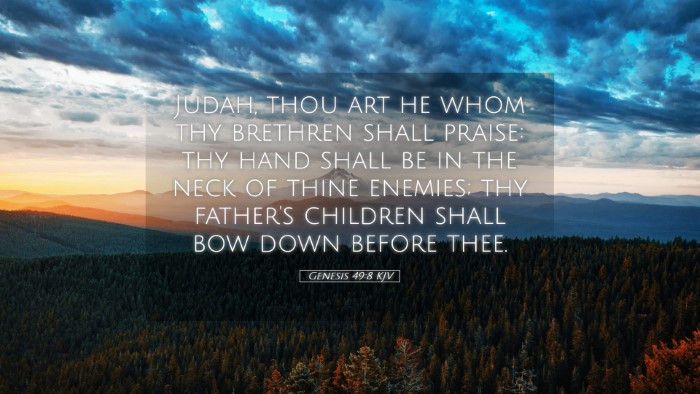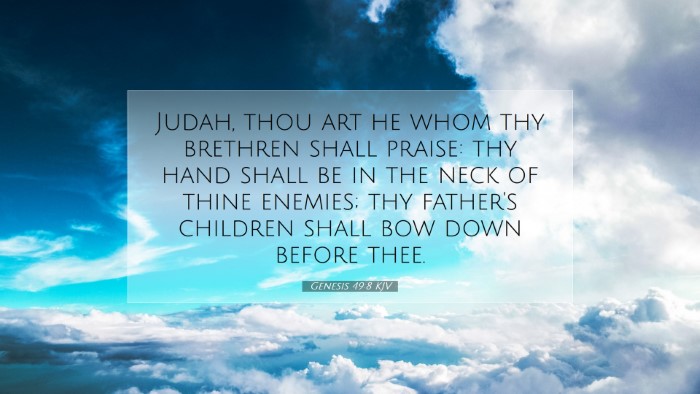Commentary on Genesis 49:8
Genesis 49:8 presents a significant prophecy regarding Judah, delivered by Jacob as he blesses his sons. This verse states:
"Judah, thou art he whom thy brethren shall praise: thy hand shall be in the neck of thine enemies; thy father's children shall bow down before thee."
This commentary explores the profound implications of this text through insights from prominent public domain commentators.
1. Contextual Overview
The context of Genesis 49 is Jacob's prophetic blessings to his twelve sons, each representing the future tribes of Israel. As the dying patriarch, Jacob's words carry heavy significance, delineating future roles and characteristics of the tribes. Judah's blessing is particularly noteworthy and heralds a messianic line.
2. Insights from Matthew Henry
Matthew Henry highlights that Jacob's blessing on Judah serves as an acknowledgment of the natural leadership qualities endowed upon him. Henry emphasizes two key aspects of this blessing:
-
Praise from Brethren: Judah is distinguished as one who would garner praise from his brothers. This indicates Judah's future role as a leader, suggesting that the lineage stemming from him will be celebrated and exalted.
-
Victory over Enemies: The imagery of Judah's hand being on the neck of his enemies symbolizes triumph and dominance. This is a prophetic foreshadowing of Judah's military prowess and eventual kingship.
Henry notes the importance of Judah's name as well, which means "praise." This reflects both the character and destiny of Judah, propelling the theme of divine sovereign selection that weaves throughout Israel's history.
3. Contributions from Albert Barnes
Albert Barnes offers a rich theological perspective on Genesis 49:8, focusing on its implications for the Jewish people and the Christian tradition. Barnes points out:
-
A Royal Lineage: The phrase “thy father's children shall bow down before thee” anticipates the establishment of a royal lineage emanating from Judah. This is fulfilled in the later kings of Israel, particularly King David, and ultimately in the birth of Jesus Christ, who is called the Lion of the Tribe of Judah.
-
The Messianic Fulfillment: Barnes emphasizes that the prophecy extends beyond immediate earthly leadership to indicate the messianic hope that finds its culmination in Christ. The New Testament writings frequently connect Jesus to the lineage of Judah, thus affirming the significance of this blessing across covenantal history.
Barnes underscores that Judah's position as a tribe of prominence is rooted in divine purpose and design, reflecting God's overarching plan for redemption.
4. Reflections from Adam Clarke
Adam Clarke provides added depth by exploring the linguistic and historical significance of this verse. He notes:
-
Historical Context: Clarke insists that the placement of Judah as preeminent among his brothers is a testament to the changing dynamics of the family, considering Reuben's disqualification due to sin.
-
Symbolism of the Lion: Clarke elaborates on the imagery of Judah's strength, comparing him to a lion, which later becomes metaphorically significant in both Jewish and Christian texts. The lion symbolizes majesty, strength, and royal authority.
According to Clarke, this blessing serves as a blueprint for understanding Israel’s future trajectory, infused with insights about leadership, rivalry, and eventual redemption.
5. Theological Implications
Genesis 49:8 is not merely an isolated verse but ingrained in the theological fabric of Scripture. The implications are manifold:
-
Leadership and Stewardship: The qualities exhibited by Judah serve as a model for leadership in both historical and contemporary contexts. A call for humility, service, and reliance on God is embedded in the rightful exercise of power.
-
Messianic Hope: This verse offers foundational support for the messianic expectations within Judaism and the Christian embrace of Jesus as the anticipated Messiah. The unbroken lineage from Judah to Jesus affirms divine promises and encourages believers to trust in God's faithfulness.
-
Eschatological Vision: The promise that Judah's brothers will bow to him encompasses a larger eschatological vision where all nations will eventually recognize God's sovereign plan through Christ. Revelations of kingship and authority are consistently reaffirmed within and beyond Scriptural boundaries.
6. Conclusion
Genesis 49:8 stands as a pivotal verse anticipating the glory and challenges of Judah's lineage. The insights provided by Matthews Henry, Albert Barnes, and Adam Clarke serve to illuminate this rich text.
As pastors, students, theologians, and Bible scholars meditate on this passage, they are encouraged to draw from its lessons on leadership, the nature of praise, and the profound interconnectedness of Israel's history with God's redemptive plan through Jesus Christ.


